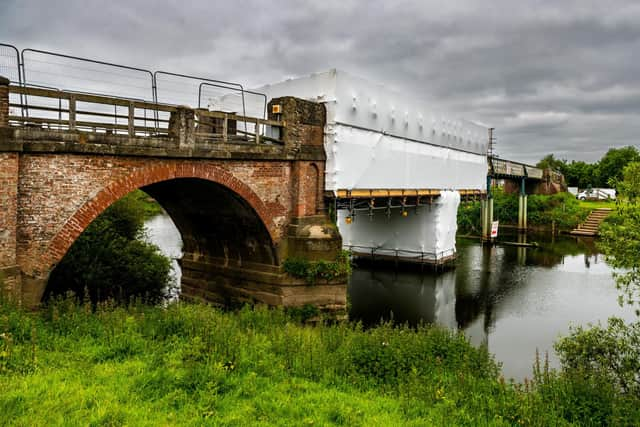Aldwark Toll Bridge: Yorkshire's only privately-owned toll bridge to re-open after 10-month closure - with fees to stay the same
The crossing over the River Ure near Easingwold, which was built in 1880, shut to traffic in April last year, and was originally meant to open in October before the closure was extended until December when more defects were found.
It has now been announced that it will be open again on Saturday February 17 – and that tolls have not risen despite the work undertaken to install a new traffic light system.
Advertisement
Hide AdAdvertisement
Hide AdAldwark is the only remaining privately-owned toll bridge in Yorkshire, with a manager who still lives in the tollkeeper’s cottage, and one of the few surviving examples in the country.


Operations manager Dudley Valentine said: “Pricing remains at 40p and £1. You will notice that the proposed traffic light control system is not yet in place, but will be installed in due course.
"It is hoped that the majority of regular users will take advantage of the advance ticket purchasing available on the website www.aldwarkbridge.com
"It is hoped to have an official opening of the bridge on Saturday 17 February.
Advertisement
Hide AdAdvertisement
Hide AdDrivers faced a 25-mile detour without the Grade II-listed bridge, which replaced an 18th-century structure, being available.
Among the local businesses to have suffered is the Aldwark Manor Estate – a hotel, restaurant and golf course that depends on access from the A1(M).
Estate director Christopher Gitton said: ““The closure of the bridge affected our residential, leisure and corporate guests and many regular customers have been going elsewhere while it’s been closed. We are also usually a popular destination for people travelling up and down the A1, so we are delighted at the news that the toll bridge is reopening on February 17.
"We re-opened our golf course in June, and the bridge’s closure affected our membership numbers as well as pay and play. Our leisure and spa facilities also relied heavily on local clientele from the other side of the bridge. It’s one of those scenarios where I don’t think people realised how much they needed the bridge, until they weren’t able to use it. The impact on our business, other businesses and the local community has been significant, but we also appreciate how important it was for the work to be done.
Advertisement
Hide AdAdvertisement
Hide Ad"The reopening of the bridge will also be a huge relief for dozens of our staff as their commute to work will take considerably less time.”
The bridge was purchased by Derbyshire businessman Alex Bell in 2020, and a structural survey then found that the archways needed to be repaired and the deck replaced.
The toll, set at 40p for a vehicle not towing a trailer, has not changed for almost 20 years despite both inflation and the owners’ attempt to double it in 2020, which was refused by a government planning inspector.
The bridge’s ownership over the centuries has been shrouded in mystery. A local landowner received parliamentary permission to build it in 1772, in order to replace a ferry service and speed up journeys. It was owned in the 20th century by a company called Yorkshire Farmers Ltd, and was then sold in the 1960s to the Montagu Burton clothing manufacturer, based in Leeds.
Advertisement
Hide AdAdvertisement
Hide AdFuture plans for the bridge include improving the traffic flow and reducing congestion at the approaches through the introduction of automation and a traffic light system, which would prevent two cars crossing in opposite directions at the same time. Smart card payments are also being considered.
The largest expense for the bridge’s owner is wages, which have doubled since 2005.
In the 1960s, the bridge and others like it were even debated in Parliament, with MPs expressing frustration on behalf of their constituents that fees were levied by ‘anonymous’ landowners who did not pay tax on the tolls as the laws around the system dated from the Georgian era.
At the time, Aldwark’s female tollkeeper was mentioned, as she earned just £1 for a seven-day, 7am-10pm working week once the rent for her tied cottage had been deducted.
